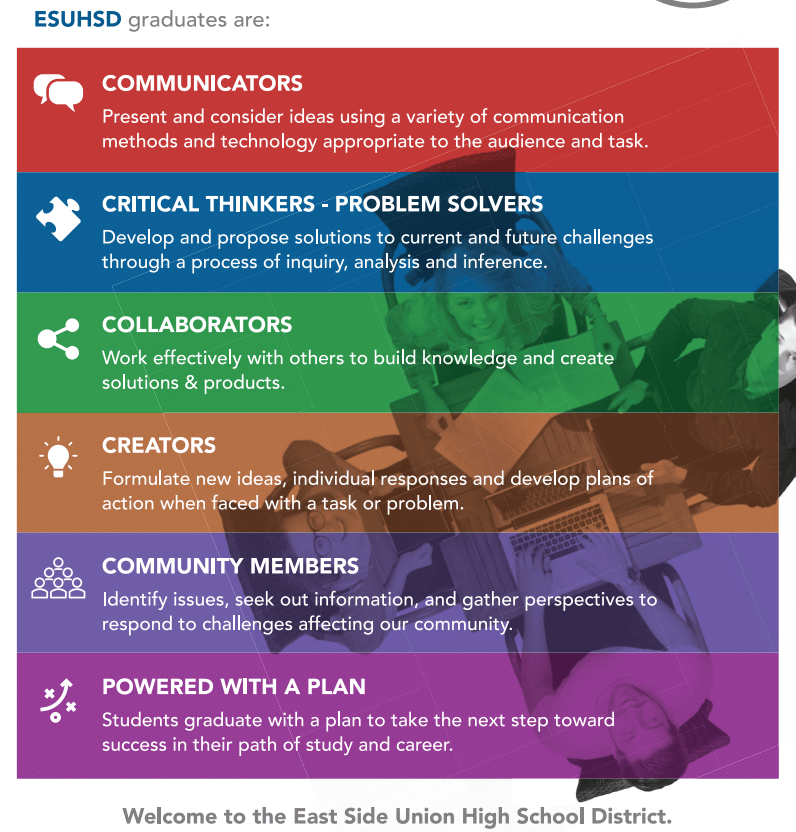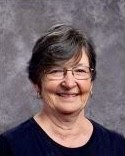Defining Student Success, Not Just Graduation

What Do Our Students Need to Graduate from High School?
For a high school diploma, school districts typically require that students complete specific classes with at least a passing grade and maybe fulfill a few hours of community service.
Is graduation enough?
Is it enough? From the introduction of AI to environmental instability to political unrest, the world has become more volatile and unpredictable. Parents, schools, and communities ought to be focused on a more important question: When students graduate from high school, what skills and attitudes will be essential for them to succeed in world that seems so uncertain?
The Power and Potential of a Graduate Profile
More than 100 California school districts have already answered that question in a serious and meaningful way by creating a Graduate Profile. Although it can take different forms and go by other names, such as portrait of a graduate, a Graduate Profile is generally a document that is created through a community engagement process involving educators, students, their family members, business partners, community and civic leaders.
An examination of Graduate Profiles in several school districts reveals some common themes. In most cases, profiles are built around a set of succinct statements that reflect a combination of knowledge, skills, competencies, and qualities.
- Demonstrate academic and professional excellence (including content mastery and academic skills in reading, writing, and math)
- Gather, filter and synthesize information from a wide variety of sources
- Create new ideas based upon strong content knowledge
- Possess self-discipline and appreciate the importance of goal-setting
- Acquire strong organizational skills to support academic and personal growth
- Have the option to complete courses that satisfy A-G requirements for University of California and California State University eligibility
- Are prepared for the post-secondary program of their choice in college, career, vocation or employment
- Are reliable, punctual and professional with proper etiquette
- Possess financial literacy and basic money management skills
- Are equipped with a range of interpersonal, academic, vocational, and technological skills
- Possess career skills that will enable them to compete locally and globally
Academic preparation
Academic preparation is an element of most lists. In Pasadena Unified School District, for example, the top set of criteria (see box) are broadly defined as “Prepared for College and Career.”
Deeper Learning
Another set of competencies are often grouped together as “Deeper Learning” or “21st Century Skills.” These are the “4 C’s” of creativity, collaboration, communication and critical thinking. Communities describe these using varying words, but the ideas are reflected in some way in every Graduate Profile. The one pictured here, from Eastside Union High School District, is a good example.
Social-emotional learning
Similarly, aspects of social-emotional learning turn up in various ways in the goals that different communities have set for their graduates. They include such qualities and skills as self-awareness, self-management, social awareness, relationship skills, responsible decision-making, adaptability and flexibility, resiliency, growth mindset, and empathy.
Civic engagement
Graduate Profile designs also often include aspects of cultural awareness, community service and civic engagement. For example, Centinela Valley Union High School District has as one of its goals that “Graduates will act as productive citizens who serve in the community to improve the quality of life…”
Putting the same concepts into a competency they call “Civic and Cultural Awareness,” Davis Joint Unified School District envisions that:
“Students will develop and establish an awareness of the responsibilities of contributing individuals in a diverse society. They recognize and respect the differences in values that may exist between themselves and people from other countries or from varying social and cultural backgrounds.”
Moving “From Poster to Practice”
A thoughtful process to create these succinct statements of purpose can take months of meetings involving students, educators, community members and families. The aspirational goals they agree upon often end up being posted in all of a district’s schools and classrooms. However, those posters can easily become little more than wall decoration unless all those stakeholders, but particularly parents and school district leaders, make sure that teachers, school principals, and business/community partners all take action to turn the poster into practice, and the rhetoric into reality.
|
Has Your District Created a Graduate Profile? |
|
|---|---|
|
NO. If the answer is no, what would it take for district leaders to start the conversation? One good resource for getting started is available from Battelle for Kids (linked here). |
YES. If the answer is yes, are there opportunities to rethink business as usual? What steps is your district taking (or should it take) to change the way students learn, teachers teach, leaders lead, equity is assured, and progress is measured? For example, some districts use their Local Control Accountability Plan (LCAP) to specify measurable student outcomes that show up in their Graduate Profile. |
How will your community define success for its graduates? What will our young people need in a world where A.I is changing assumptions and something as monumental as a global pandemic can occur?
Moving “from poster to practice” is pioneering work, but more than 100 school districts in California now use Graduate Profiles. Scaling Student Success, a nonprofit California partnership of school districts and service providers, is developing strategies that use Graduate Profiles as the guiding star for school improvement.
Tags on this post
All Tags
A-G requirements Absences Accountability Accreditation Achievement gap Administrators After school Algebra API Arts Assessment At-risk students Attendance Beacon links Bilingual education Bonds Brain Brown Act Budgets Bullying Burbank Business Career Carol Dweck Categorical funds Catholic schools Certification CHAMP Change Character Education Chart Charter schools Civics Class size CMOs Collective bargaining College Common core Community schools Contest Continuous Improvement Cost of education Counselors Creativity Crossword CSBA CTA Dashboard Data Dialogue District boundaries Districts Diversity Drawing DREAM Act Dyslexia EACH Early childhood Economic growth EdPrezi EdSource EdTech Education foundations Effort Election English learners Equity ESSA Ethnic studies Ethnic studies Evaluation rubric Expanded Learning Facilities Fake News Federal Federal policy Funding Gifted Graduation rates Grit Health Help Wanted History Home schools Homeless students Homework Hours of opportunity Humanities Independence Day Indignation Infrastructure Initiatives International Jargon Khan Academy Kindergarten LCAP LCFF Leaderboard Leadership Learning Litigation Lobbyists Local control Local funding Local governance Lottery Magnet schools Map Math Media Mental Health Mindfulness Mindset Myth Myths NAEP National comparisons NCLB Nutrition Pandemic Parcel taxes Parent Engagement Parent Leader Guide Parents peanut butter Pedagogy Pensions personalized Philanthropy PISA Planning Policy Politics population Poverty Preschool Prezi Private schools Prize Project-based learning Prop 13 Prop 98 Property taxes PTA Purpose of education puzzle Quality Race Rating Schools Reading Recruiting teachers Reform Religious education Religious schools Research Retaining teachers Rigor School board School choice School Climate School Closures Science Serrano vs Priest Sex Ed Site Map Sleep Social-emotional learning Song Special ed Spending SPSA Standards Strike STRS Student motivation Student voice Success Suicide Summer Superintendent Suspensions Talent Taxes Teacher pay Teacher shortage Teachers Technology Technology in education Template Test scores Tests Time in school Time on task Trump Undocumented Unions Universal education Vaccination Values Vaping Video Volunteering Volunteers Vote Vouchers Winners Year in ReviewSharing is caring!
Password Reset
Search all lesson and blog content here.
Login with Email
We will send your Login Link to your email
address. Click on the link and you will be
logged into Ed100. No more passwords to
remember!






 Mary Perry, a long-time advisor of Ed100, contributes frequently to the Ed100 blog. She previously served on the advisory board of Scaling Student Success, a California organization that partners with education leaders across the state to help ensure each and every student develops the skills, capabilities, and competencies needed for lifelong success. The Graduate Profiles cited above come from the growing list of participating schools and
Mary Perry, a long-time advisor of Ed100, contributes frequently to the Ed100 blog. She previously served on the advisory board of Scaling Student Success, a California organization that partners with education leaders across the state to help ensure each and every student develops the skills, capabilities, and competencies needed for lifelong success. The Graduate Profiles cited above come from the growing list of participating schools and 








Questions & Comments
To comment or reply, please sign in .